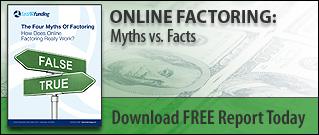 The first thing that comes to mind for most when considering short-term business loans
The first thing that comes to mind for most when considering short-term business loans
is talking to the bank whey they have their operating account. It seems obvious that the first place to look for a business loan is
at your bank.
It’s true that practically all banks offer short-term business loans, however, you may not end up with a loan that is beneficial to your business at all. A loan with terms that are heavily skewed in favor of the bank could very well cost you your business.
Banks make money by making loans. They have a strong interest in charging you as much as possible. It doesn’t necessarily mean they are out to get you. Banks aren’t inherently evil. However, most don’t have your best interest at heart.
Fees Are In the Fine Print
The biggest pitfall business owners fall into with short-term business loans is hidden fees. You know that you will be paying interest on your loan, but what about monthly maintenance fees, collateral management fees, audit fees, wire fees, legal fees, reporting fees and others?
It doesn’t take many fees to turn your interest rate of 8% into an APR of, say, 12% or more. When you’re charged a fee for practically every little thing, they have a substantial impact on your cost of funds.
You should read your loan agreement word for word. Be very careful of fees that are buried in blocks of text within the agreement. Don’t expect to see everything spelled out in a neatly organized list.
Everything Is Negotiable
When working with a large bank, it’s easy to feel insignificant. You’re just an account number in a database with millions of entries. So when you’re offered loan terms, it feels like it’s on a take it or leave it basis. Don’t forget though, you are working with an individual who likely has a vested interest in closing this loan.
In traditional banks many financial products, including short-term business loans, are “sold” on a commission basis. The banker you’re working with is likely to receive some type of compensation when the loan is closed.
Don’t be afraid to negotiate the interest rate, the fees, the payment terms, the length of the loan, loan covenants and reporting requirements. There are very few items carved in stone in the world of commercial lending.
When The Loan Is Due You Could Lose Your Company
That may be a bit extreme, but it is a possibility. Many short-term business loans are not structured in a way where they are fully repaid before the agreement terminates. You would say they don’t fully amortize.
In many cases you only pay interest and perhaps a small principal payment. This leaves a large balloon payment due at the end of the term. The banker’s line is that you can simply renew the agreement or refinance with another lender at the end of the term, but what happens if that bank isn’t agreeable to renewing and you are unable to refinance with another lender? In that case, the bank has every right to foreclose and liquidate your business to repay the loan.
Alternatives To The Big Banks
Fortunately, a wide array of financing options exists outside of traditional banks. One option is specialty accounts receivable financing, which is specifically designed to improve cash flow, which is the primary reason that small businesses seek outside financing.
Don’t think that the bank that you deposit checks at is the only option you have when it comes to financing your business. There are short-term business loans that are straightforward and easy to understand, loans that don’t have endless fees and restrictive payment terms. Be sure to evaluate all of your options to ensure you find the best option for your business. You need the option that helps, not harms, your business.
Still unsure about factoring as a short-term business loan option? Download our FREE Tip Sheet Online Factoring: Myths vs. Facts. Our free tip sheet addresses many of the myths in factoring advertising and how to best prepare to search for a factoring company.
Have a specific question? Call 888.833.2286 to speak to a Cash Flow Consultant.










